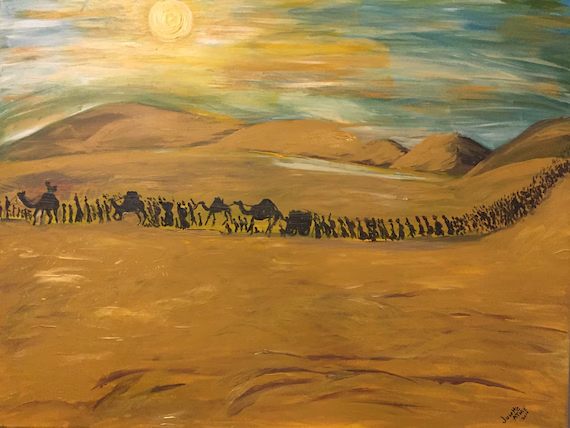Death on a Cross
The soldiers led Jesus through the streets of Jerusalem, making him carry a huge wooden cross.
Jesus was very tired and weak from all the beatings he had been given, and he stumbled and fell again and again under the weight of the cross.
At last, a soldier made a man named Simon., who was standing in the street watching the procession, carry the cross for Jesus.
They struggled on to a place outside the city walls, called Golgotha. There, the guards nailed Jesus to the cross by his hands and feet.
They nailed a sign above his head which said; 'Jesus of Nazareth. King of the Jews.
Then they set up the cross between two other crosses. On them were thieves who had also been sentenced to death.
Jesus looked down at the soldiers and the people watching.
'Forgive them, Father, he prayed. 'They don't know what they are doing.
Some of his enemies in the crowd shouted to him, If you really are the Son of God, come down from the cross. Then we'll believe you, they taunted.
The Chief Priests called out; 'You saved others, why don't you save yourself?
One of the thieves on a cross jeered at Jesus, saying. 'If you really are the King of the Jews, save yourself and us.
The other one answered. 'We deserve to die, but this man has done no wrong. Then he said to Jesus. Remember me.
At noon, the sky grew strangely dark for about three hours. The crowd of people standing around the cross watched and waited in silence.
At three o'clock. Jesus looked up and cried. 'My God, why have you abandoned me? Bowing his head, he said;
'Father. I put my spirit into Your hands, and he died.
At that moment, the ground shook and the curtain in the Temple ripped from top to bottom. Many of the soldiers and the people were very frightened.
One Roman soldier looked up at Jesus and said; 'This man really was the Son of God.
The crowds drifted away to the city but Mary, the mother of Jesus. Mary Magdalene.
Mary, the mother of the disciple James, and some of their other friends stayed by the cross.
To make sure Jesus was dead a soldier thrust a spear into his side.
Then the soldiers took Jesus down from the cross.
Joseph carried the body away, accompanied by some friends of Jesus, and wrapped it in a linen cloth.
Then they took it to a new tomb which had been cut into the rock on a hillside garden outside Jerusalem.
They laid the body in the tomb. Then they rolled a huge, heavy stone in front of it, like a door, to close it.
It was now Friday evening. The Jewish Sabbath begins at sunset, and they had to leave the proper burial of Jesus until the Sabbath on Saturday was over in the evening.
The Jewish leaders asked the Roman Governor to appoint a guard to watch the tomb. They were afraid that someone might try to steal the body and claim that Jesus had come alive again.
Pontius Pilate gave the order: his soldiers put a seal on the tomb and stood guard over it during the night.
Jesus, when you come as King. Jesus answered. 'I tell you truly that today you'll be with me in paradise.
Mary, the mother of Jesus, was standing near the cross with John, one of the disciples. Jesus looked down at them.
'Take care of her as if you were her son, he said to John.
And from then on, John took care of Mary.











Comments
Post a Comment